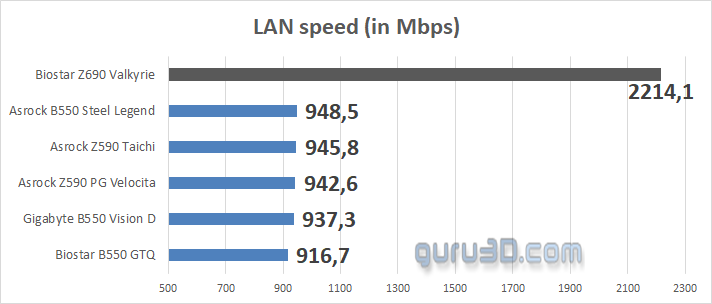Performance - Ethernet LAN 1 Gigabit/Wifi
Performance - Ethernet (LAN 1 Gigabit)
Next to Wi-Fi performance, the new trend is faster Ethernet. We’ll slowly transition from 1 Gigabit towards 10 Gigabit connections in the coming years, with 2.5 and 5 Gbps available. We’ll start with a 2.5 Gigabit uplink as it’s the max that’s available at my place (the max for this motherboard is 2.5 Gigabit).
Above the 2.5 GigE LAN connection (first time, previously I didn't have the hardware for that on the network side), this is as good as things can get; 2374 Mbps is 276 MB/sec of transfer throughput.
Performance – Wifi
For our tests, we emulate what you would get performance-wise inside a multi-story house with a concrete ground and 1st floor, and also do a 5-meter test with the devices separated by walls. We test single-band 2.4 GHz and single-band 5 GHz. The router (host) is positioned at ground level, and we do the tests with the client in several locations.
Performance Wireless 802.11ax WIFI
Most enthusiast-class motherboards these days have integrated Wi-Fi, and there are so many standards. One of the more interesting ones is Wireless AC AKA 802.11ac (WIFI5) and, as of recently, 802.11ax (WIFI6). We use the AX3 router. Motherboards with a unit like that are becoming more common, so you can expect to see more of them here at Guru3D.com. Wireless AX draft 802.11ax technology was developed to optimize video streaming experiences. With an increasing number of Wi-Fi devices in the home leading to greater internet consumption, gigabit Wi-Fi speeds allow content to download faster and large video or music files to sync more quickly.
Unfortunately, the Wi-Fi card is not installed in default state for the Biostar Z690 Valkyrie, so we could not perform this test.


